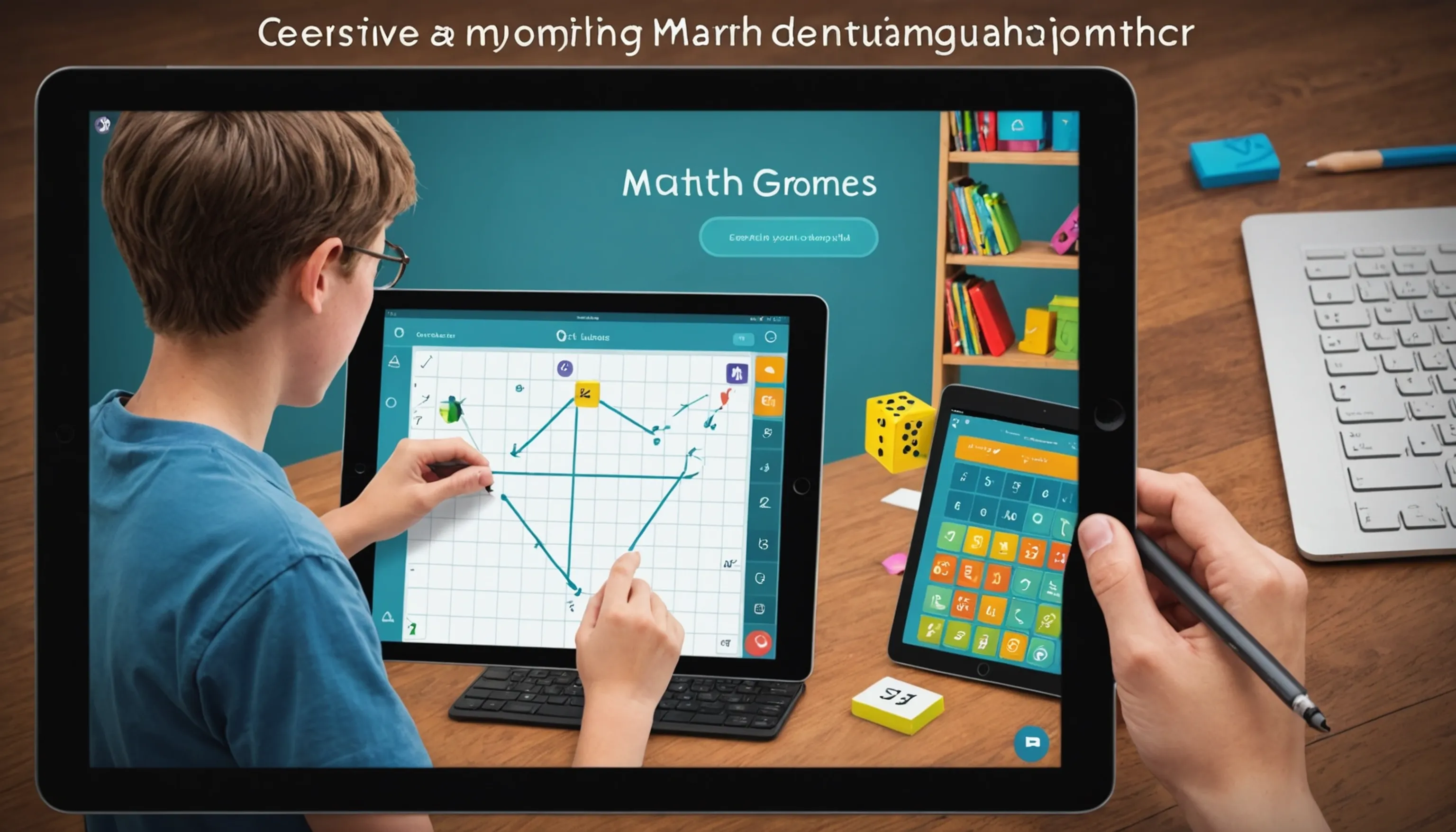Math Games as a Smart Pastime
 HvWHenry van Wagenberg
HvWHenry van Wagenberg
Why Math Games are a Smart Pass-Time for Teens
Math games are a smart pass-time for teens because they transform learning into an engaging activity. Instead of viewing math as a chore, teens can enjoy various games that challenge their skills while having fun. These games encourage critical thinking, promote teamwork, & enhance cognitive abilities.
Moreover, math games often involve competition, motivating teens to improve their skills and achieve better results. By integrating math into enjoyable activities, parents & teachers can foster a positive attitude towards mathematics, helping teens build confidence & proficiency in a subject that is crucial for their future academic success.
The Educational Benefits of Math Games
Math games offer numerous educational benefits that significantly enhance the learning experience for teens. First & foremost, these games promote a deeper understanding of mathematical concepts. Instead of merely memorizing formulas, teens engage with the material actively, which fosters long-term retention.
One of the key advantages of math games is their ability to improve problem-solving skills. As teens encounter various challenges within the games, they learn to analyze situations, develop strategies, & think critically to find solutions. This skill set is not only essential for math but also applicable across all subjects and in real-life scenarios.
Furthermore, math games create a collaborative learning environment. When played in groups, they encourage teamwork & communication, allowing teens to share ideas & learn from each other. This social aspect can make math less intimidating & more enjoyable.
Additionally, math games often incorporate elements of competition, which can motivate teens to improve their skills. The thrill of winning or achieving a high score can push them to practice more, leading to increased proficiency in mathematics.
Finally, these games help identify areas where teens may struggle. By observing how they interact with different challenges, parents & teachers can pinpoint specific concepts that may need additional focus, allowing for targeted support & intervention. Overall, math games are a powerful tool for enhancing mathematical understanding & building a strong foundation for future academic success.

How Math Games Enhance Problem-Solving Skills
Math games are an excellent way to enhance problem-solving skills among teens. When teens engage in these games, they are often required to think critically and strategically to overcome challenges. This process encourages them to approach problems from different angles, fostering a mindset that values exploration and creativity.
One significant aspect of math games is that they present various scenarios that require players to apply mathematical concepts in real-time. For example, a game might involve solving puzzles that require quick calculations or logical reasoning. As teens navigate these challenges, they develop the ability to break down complex problems into manageable parts, a skill that’s vital in both academic and everyday situations.
Moreover, math games often involve trial and error, allowing teens to experiment with different strategies. This iterative process teaches them the importance of persistence and adaptability when facing obstacles. Instead of fearing failure, they learn that mistakes are part of the learning journey and can lead to greater understanding.
Additionally, many math games encourage collaboration, whether in person or online. Working with peers to solve problems can lead to discussions that deepen understanding and reinforce learning. Teens can share their thought processes and learn new strategies from one another, further enhancing their problem-solving capabilities.
Overall, math games not only make learning enjoyable but also equip teens with essential problem-solving skills that will benefit them in various aspects of their lives.
Different Types of Math Games for Teens
There are various types of math games designed to engage teens and enhance their mathematical skills. Online math games offer interactive challenges that can be accessed anytime, making learning flexible and fun. Board games like "Monopoly" and "Prime Climb" integrate math concepts into gameplay, promoting strategic thinking.
Puzzle games, such as Sudoku and logic puzzles, help develop critical thinking and problem-solving skills. Card games that focus on math operations, like "24" or "Math Bingo," can be played in groups, encouraging social interaction while learning. Each type provides unique benefits, making math enjoyable for teens.

Online Math Games and Resources
Online math games and resources have revolutionized the way teens learn and practice mathematics. With the rise of technology, there are countless platforms offering engaging & interactive games that cater to different skill levels. Websites like Khan Academy, Prodigy Math, and Coolmath Games provide a variety of math challenges that make learning fun.
These platforms often use gamification techniques, where teens earn points, badges, or rewards for completing tasks, which motivates them to continue practicing. For instance, Prodigy Math combines a role-playing game format with math problems, allowing students to progress through levels as they master concepts.
Additionally, online resources often include tutorials and instructional videos that explain complex topics in an accessible way. This can be particularly beneficial for visual learners who grasp concepts better through visual aids. Websites like IXL offer personalized learning experiences, adapting to each student’s needs and providing targeted practice based on their performance.
Furthermore, online math games can facilitate collaborative learning. Many platforms allow teens to compete with friends or join classes, fostering a sense of community and teamwork. This social aspect can make math less daunting and more enjoyable.
In summary, online math games and resources are invaluable tools that not only enhance mathematical skills but also promote a positive attitude towards learning, making them essential for today’s tech-savvy teens.
Board Games that Promote Math Skills
Board games are a fantastic way to promote math skills among teens while providing a fun and interactive experience. These games often combine strategy, critical thinking, and mathematical concepts, making them an excellent educational tool. Here are some notable board games that can enhance math learning:
- Monopoly: This classic game teaches financial literacy, including budgeting, property management, and basic arithmetic as players buy, sell, and trade properties.
- Prime Climb: A colorful board game that reinforces multiplication, division, and prime number concepts. Players navigate the board using math operations to reach the center.
- Math Dice: A fast-paced game where players roll dice to create equations that match a target number. This game encourages mental math and quick problem-solving.
- Sum Swamp: Designed for younger teens, this game helps improve addition and subtraction skills while navigating through a swamp filled with mathematical challenges.
- Blokus: While primarily a strategy game, Blokus requires spatial reasoning and planning, which are important math skills.
Incorporating these board games into family game nights or classroom activities can make math learning enjoyable. They encourage collaboration, communication, and critical thinking among players. Plus, the competitive element adds excitement, motivating teens to improve their skills while having fun. Overall, board games provide an excellent way to develop math skills in an engaging environment.
Incorporating Math Games into Daily Life
Incorporating math games into daily life can significantly enhance a teen's mathematical skills while making learning enjoyable. Parents and teachers can introduce simple games during everyday activities. For instance, while shopping, parents can encourage teens to calculate discounts or total costs. Cooking can also be an opportunity to practice measurements and fractions.
Additionally, setting aside time for board games or online math challenges during family game nights can reinforce skills in a fun way. By integrating math games into daily routines, teens can develop a positive attitude toward math and improve their problem-solving abilities effortlessly.
Making Math Fun at Home
Making math fun at home is essential for encouraging teens to develop a positive attitude towards mathematics. One effective way to achieve this is through the use of engaging math games that can be easily integrated into daily routines. For example, parents can introduce board games that incorporate math concepts, such as Monopoly or Prime Climb, during family game nights. These games not only entertain but also help improve critical thinking and problem-solving skills.
Another approach is to utilize technology by exploring online math games and apps. Websites like Khan Academy and Prodigy Math offer interactive challenges that make learning enjoyable. Setting up a family competition with these online resources can spark excitement and motivation among teens.
Additionally, everyday activities can be transformed into math-learning opportunities. While cooking, parents can ask teens to measure ingredients, convert units, or calculate cooking times, thereby reinforcing practical math skills. Shopping trips can also be turned into math lessons by asking teens to calculate discounts or compare prices.
Moreover, creating a math-themed environment at home can help foster a love for the subject. Displaying math-related posters, puzzles, or even incorporating math into decorations can remind teens that math is everywhere.
By integrating these fun and interactive methods into home life, parents can help teens view math as an enjoyable and valuable skill, ultimately leading to improved proficiency and confidence.
Using Math Games in the Classroom
Using math games in the classroom can significantly enhance students' engagement and understanding of mathematical concepts. Incorporating games into lessons transforms traditional learning into an interactive experience, making math more approachable and enjoyable for students. One effective method is to start each class with a quick math game to warm up students' minds. This can be as simple as a math trivia quiz or a competitive round of Math Jeopardy.
Another approach is to use group activities that promote collaboration. Games like Math Bingo or Math Relay encourage teamwork and communication among students, fostering a positive classroom environment. Students can work together to solve problems, share strategies, and learn from one another. This collaborative approach not only reinforces math skills but also builds social skills.
Additionally, digital math games can be integrated into the curriculum using tablets or computers. Platforms like Prodigy and Kahoot! provide interactive challenges that adapt to each student's skill level, ensuring personalized learning experiences. These digital tools can also motivate students through gamification, allowing them to earn points and rewards for their achievements.
Furthermore, math games can be tailored to reinforce specific concepts being taught, making them an effective tool for review and practice. By incorporating fun and engaging math games into the classroom, teachers can create a dynamic learning environment that not only improves students' mathematical skills but also encourages a lifelong love for learning.
